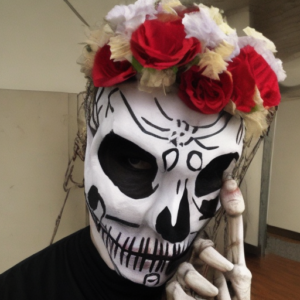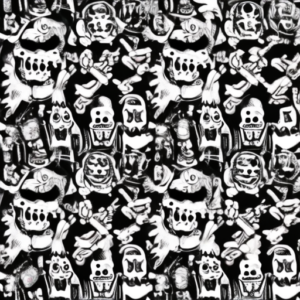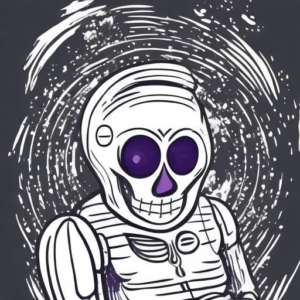 Halloween is approaching, and that leads to spooky thoughts.
Halloween is approaching, and that leads to spooky thoughts.
It is known that the dead outnumber the living by a factor of about 13:1. Hence anything that affects the welfare of the dead can affect a large number of people, assuming that the dead are people and have welfare.
The traditional answer is to remember and honour ancestors, a near-universal practice. Assuming this improves ancestor well-being significantly this would seem to be a very effective thing to do. Bigger, better and more frequent All Hallows Eve and Dia Los Muertes celebrations as a new cause area for philanthropists?
Not so fast. First, it is not entirely clear how much well-being is improved (cost effectiveness may be low), but more importantly, most ancestor veneration only goes back a finite number of generations. While there is some general veneration of the dead in general, mostly the focus is on people who are remembered. Since cultural memory only lasts a few generations that means that only a fraction of the dead will benefit. Hence at the very least veneration of all dead seems to scale better and treat each soul neutrally. In a prioritarianism framework veneration of neglected dead is even more important.
However, a more serious issue is the general welfare state of the dead. If there are places of eternal punishment they are obviously major sources of disvalue (unless one thinks they are just punishments, in which case they might be positive) and should be removed. Even improving a fairly dreary afterlife like the Greek one would seem to provide a potential long-lasting benefit to a vast number. While clearly a neglected question, tractability appears low. Still, especially models ascribing near-pessimal suffering lasting eternally would run into the fanaticism problem that improving this would always be the top priority intervention, no matter how hard. One can consider this a form of Pascal’s mugging.
 Taking a longtermist perspective on the dead produces other interesting issues. Over the span of the future many people will die, producing a potentially vast number of future dead. If the dead have unlives worth living this can become a dominant contribution to the overall good. If the dead have unlives not worth living on the other hand it becomes a strong argument for either early extinction, or radical life-extension ensuring that future generations do not die. If the afterlife can be improved in the future or future dead can be given unlives worth living this can also outweigh the current issue.
Taking a longtermist perspective on the dead produces other interesting issues. Over the span of the future many people will die, producing a potentially vast number of future dead. If the dead have unlives worth living this can become a dominant contribution to the overall good. If the dead have unlives not worth living on the other hand it becomes a strong argument for either early extinction, or radical life-extension ensuring that future generations do not die. If the afterlife can be improved in the future or future dead can be given unlives worth living this can also outweigh the current issue.
One issue is whether dead are resistant to proton decay and the heat death of the universe. If they are, and their state can be improved to be positive, then this might provide a massive existential hope.
Clearly these considerations are preliminary. We do not have a strong evidence base to even estimate QAUYs (Quality Adjusted Unlife Years) to an order or magnitude. It is very possible that dead have literally zero experience and well-being. But as the above considerations show, even a low credence of nonzero QAUYs provide in expectation a very strong reason to act in some way, if possible. Hence the value of information in regard to the state of the dead is extremely high. This suggests that paranormal investigations should be regarded as a potentially valuable near term cause area for effective altruism.
 However, this might miss an even bigger opportunity: ghostly effective altruism. While dead people likely have a fairly weak ability to affect the physical world, if they have the abilities commonly ascribed to them (perceive descendant lives, precognition, nudge things in an eerie way) they could, if they coordinated better, likely improve the life of the living in many ways. Since there are many dead per living individual, that would give each living person a team that could enhance their life. Even if past dead may not have been too effective, we should expect an increasing number of effective altruists in the afterlife. They may of course primarily choose to focus on the biggest risks, haunting nuclear weapons control systems, biowarfare labs and sleep depriving AI researchers with a lacking commitment to safety.
However, this might miss an even bigger opportunity: ghostly effective altruism. While dead people likely have a fairly weak ability to affect the physical world, if they have the abilities commonly ascribed to them (perceive descendant lives, precognition, nudge things in an eerie way) they could, if they coordinated better, likely improve the life of the living in many ways. Since there are many dead per living individual, that would give each living person a team that could enhance their life. Even if past dead may not have been too effective, we should expect an increasing number of effective altruists in the afterlife. They may of course primarily choose to focus on the biggest risks, haunting nuclear weapons control systems, biowarfare labs and sleep depriving AI researchers with a lacking commitment to safety.
So if you encounter something mysterious and frightening late at night, maybe it is just a nudge from the other side to increase the long-term flourishing of humanity.
Happy Halloween!